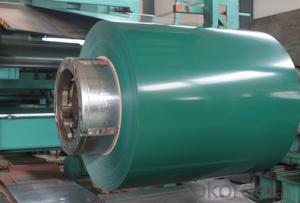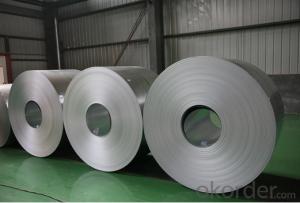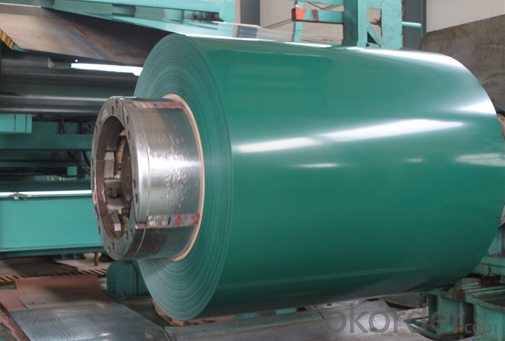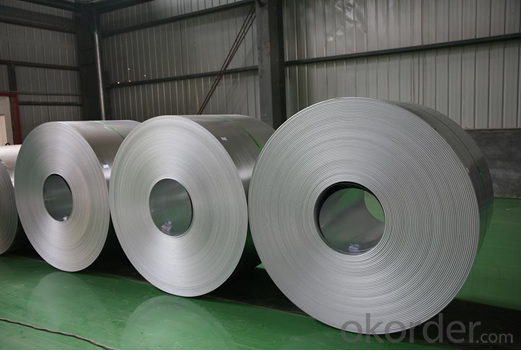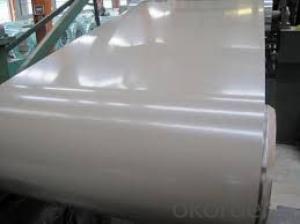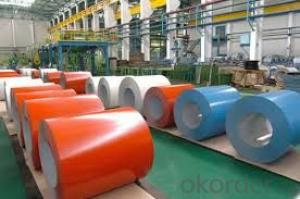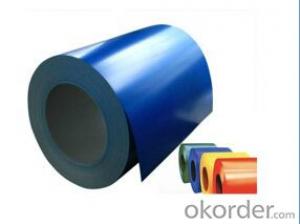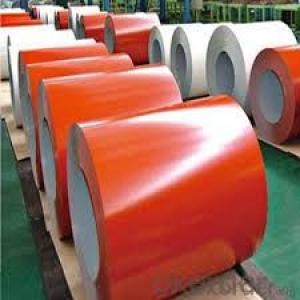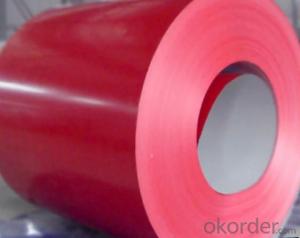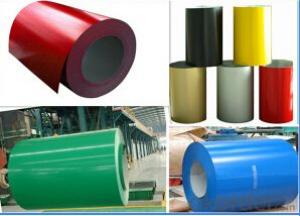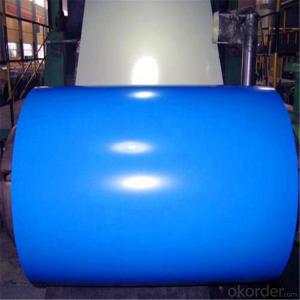0.3mm Thickness PPGI Prepainted Galvanized Steel Coil With Different Width
- Loading Port:
- China main port
- Payment Terms:
- TT OR LC
- Min Order Qty:
- 25 m.t.
- Supply Capability:
- 10000 m.t./month
OKorder Service Pledge
OKorder Financial Service
You Might Also Like
0.3mm Thickness PPGI Prepainted Galvanized Steel Coil With Different Width
Product Description
Specifications:
1. Thickness: 0.12mm-1.3mm
2. Width: 600mm-1250mm
3. Length: According to client's demands
4. Top paint: 15 to 25 um (5 um + 12-20 um)
Back paint: 7 +/- 2 um
5. Gloss: Normal or High gloss
6. Zinc coating: Z50-Z275G/psm
7. Inside Diameter: 508mm/610mm
8. Outside Diameter: 1000mm-1500mm
9. Coil weight: 3-8 tons
10. Payment: T/T, L/C, D/P, Paypal, Western Union
11. Trade Term: FOB, CFR, CIF
12. MOQ: 25 Mt
13. Package: Export standard package or as request
14. Shipment: By container
15. Standard: AISI, ASTM, BS, DIN, GB, JIS
16. Grade: JIS G3322, CGLCC, ASTM A755, CS-B
Company Introduction:
CNBM Steel is mainly engaged in producing and exporting galvanized steel coil/sheet(GI), prepainted galvanized steel coil/sheet(PPGI), corrugated galvanized sheet and tinplate coil/sheet. CNBM Steel has also become the agent of hot rolled coil/sheet, cold rolled coil/sheet, I beam, angle steel and channel steel.
Company Culture:
Take customers as the honoured, Take quality as the foundation!
Strive For Survival On The Basis Of Quality!
Why Us:
1. ISO, BV, CE, SGS approved
2. Competitive price and quality from our own factory
3. Efficient service team online for 24 hours
4. Smooth production ability(50000tons/month)
5. Quick delivery and standard exporting package
6. Flexible payment with T/T, L/C, etc
Name | 0.3mm Thickness PPGI Prepainted Galvanized Steel Coil |
Resin constructure | Double painting and double baking process |
Productivity | 150,000Tons/year |
Thickness | 0.12-1.3mm |
Width | 600-1250mm |
Coil Weight | 3-8 Tons |
Inside Diameter | 508mm Or 610mm |
Outside Diameter | 1000mm-1500mm |
Zinc Coating | Z50-Z275G/psm |
Painting | Top: 15 to 25 um (5 um + 12-20 um) back: 7 +/- 2 um |
Standard | JIS G3322 CGLCC ASTM A755 CS-B |
SurfSurface coating | PE, SMP, HDP, PVDF |
Back side coatingcolor | Light grey, white and so on |
Application | PPGI is featured with light-weight, good looking and |
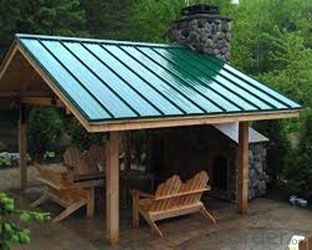

FAQ
1. Do you have QC team?
Yeah, sure, our QC team is very important, they will keep the quality control for our products.for quality inspection every day.
2. What's your normal delivery time?
Our delivery time about 10-20days for standard sizes, if you have other requirements like hardness and width ,it is about 20-40days. But don't worry ,we also try our best for the delivery time ,because time longer and our cost is higher.
3.Are the products tested before shipping?
Yes, all of our PPGI and GI was qualified before shipping. We test every batch every day.
- Q: How are steel coils used in the manufacturing of tools and equipment?
- Steel coils are used in the manufacturing of tools and equipment as they provide a versatile and durable material for construction. These coils are typically shaped, cut, and molded into various components such as blades, shafts, and handles, which are then assembled to create the final product. The strength and resilience of steel make it an ideal choice for tools and equipment, ensuring longevity and optimal performance in various industries.
- Q: why do you need to heat steel when hardening, molecules etc etc
- Metalurgy is a fascinating science which has been used to mark the ages of civilization: the Bronze Age, the Iron Age, etc. Ancient sword makers heated steel until the polished surface showed a straw color (which we now know to be about 550°F, and due to surface oxides) and then plunged the blade into a tank of water. The blade was quickly removed, repolished, and observed closely for heat transfer from the core returning the surface to straw color. If so, it was quenched again. This technique left the surface hard without making the blade brittle. Today the steel crystal lattice is known to be either face centered cubic (iron atoms at the corners of a cube and iron atoms centered in the faces of the cube) or body centered cubic ( iron atoms at the corners of the cube and an iron atom at the geometric center of the cube). Most experienced machinists can estimate the temperature of steel from the color of its surface oxides.
- Q: Are steel coils used in HVAC systems?
- Yes, steel coils are commonly used in HVAC (Heating, Ventilation, and Air Conditioning) systems.
- Q: Are steel coils used in the packaging industry?
- Yes, steel coils are commonly used in the packaging industry for various applications such as strapping, bundling, and securing heavy loads.
- Q: If steel content is too cheap, what content should I be looking for? I don't think I could find something like a VG-10 here...
- Confusion Sucks. Why are you going into all this crap over the content of steel in the knives, your only confusing yourself. I recommend you go to a chef's supply or a good store that sells chef's utensil's and knows what he is talking about, and look at something that is comfortable for you. Chris
- Q: If needed for Defence could a stainless steel sword kill someone my buddy wanted this sword for Defece after it is sharpend here is a picture
- Stainless steel only works for knives, anything past 12 inches it starts getting brittle, carbon steel is what you are looking for. As far as home defense, if you don't know how to use it, you will be worse off.
- Q: What are the dimensions of steel coils used in the building materials industry?
- The specific application and requirements determine the varying dimensions of steel coils in the building materials industry. Typically, steel coils in this industry have a thickness ranging from 0.5mm to 3mm and a width ranging from 600mm to 1500mm. The length of the coil can vary based on the manufacturer and customer specifications. It is important to note that the weight of the coil also varies, with typical weights ranging from a few hundred kilograms to several tonnes, depending on the size and thickness of the coil. Ultimately, the dimensions of steel coils in the building materials industry are determined by the specific needs and specifications of the intended construction projects.
- Q: which is the most tough and durable steel type ??
- C'mon. Really? That's your question? How about some actual details like the application, is it going to be formed into a shape, do you need to weld it, what type of environment like corrosion and temperature is it going to be subject to? There are roughly 2,000 grades of steel and a couple hundred grades of stainless steel. Steels can be soft or they can be exceptionally hard. We need more info please.
- Q: How are steel coils used in the manufacturing of machinery?
- Steel coils are commonly used in the manufacturing of machinery as they provide a versatile and reliable raw material. These coils are processed and shaped into various components, such as gears, shafts, and frames, that are essential for the functioning of machinery. The strength and durability of steel make it an ideal choice for withstanding heavy loads and high temperatures, ensuring the longevity and efficiency of machinery in different industries.
- Q: What are the different grades of steel used for manufacturing coils?
- Manufacturing coils requires the use of various grades of steel, each selected for their specific properties and suitability for different purposes. Some commonly used grades include low carbon steel, high carbon steel, stainless steel, galvanized steel, and alloy steel. Low carbon steel, also known as mild steel, is a cost-effective option with good formability. It is ideal for applications that require low strength and high ductility, such as automotive components and construction materials. High carbon steel is characterized by its exceptional strength and hardness. It is commonly employed in the production of coils that demand high tensile strength, like springs and wires. Stainless steel, an alloy with a high chromium content, offers corrosion and oxidation resistance. It is often utilized in the manufacturing of coils for the food industry, medical equipment, and automotive applications. Galvanized steel, on the other hand, is steel coated with a layer of zinc to safeguard it against corrosion. It is frequently used in the production of coils that will be exposed to harsh environmental conditions or require excellent durability, such as roofing materials and electrical appliances. Alloy steel, formed by adding elements like manganese, nickel, chromium, or molybdenum to carbon steel, exhibits improved strength, hardness, and resistance to wear and corrosion. It finds wide application in industries that necessitate high strength and toughness, such as aerospace and automotive. Choosing the appropriate grade of steel is crucial to ensure optimal performance and longevity of the coils, as it is essential to match the specific requirements of the application.
Send your message to us
0.3mm Thickness PPGI Prepainted Galvanized Steel Coil With Different Width
- Loading Port:
- China main port
- Payment Terms:
- TT OR LC
- Min Order Qty:
- 25 m.t.
- Supply Capability:
- 10000 m.t./month
OKorder Service Pledge
OKorder Financial Service
Similar products
Hot products
Hot Searches
Related keywords
